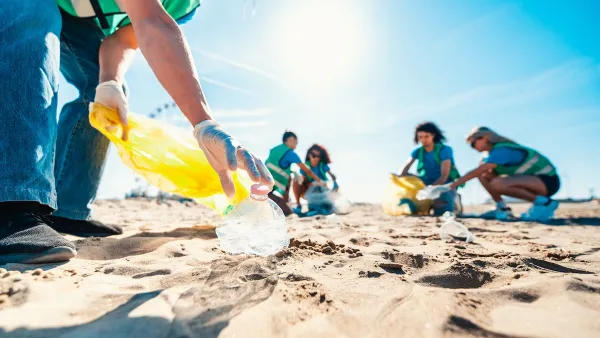In New York, according to Urban Omnibus, "Each week, approximately 64,000 tons of household and institutional waste are collected. ... But public awareness of what happens to that trash once it leaves the curb is limited."
Urban Omnibus talks with Elizabeth Royte, author of the 2005 book Garbage Land on video, "who offers a snapshot of how New Yorkers have treated their trash from the 18th century onwards."
"The immense distances trash travels (and the amount of cost and energy used to transport, transfer, recycle, incinerate or dump it) pose obvious questions about how we expend environmental resources in support of our country's vast consumption practices."
In another video, a team behind a project called Trash | Track (MIT's SENSEable City Laboratory) created sensors that allowed them to track where their trash went once it was collected. According to Urban Omnibus, "They completed a pilot project in partnership with the City of Seattle that visualized these journeys and documented the ultimate fate of pieces of trash that are barely considered after being tossed in the garbage (see introductory video below)."
FULL STORY: City of Systems: Waste Removal

Planetizen Federal Action Tracker
A weekly monitor of how Trump’s orders and actions are impacting planners and planning in America.

Map: Where Senate Republicans Want to Sell Your Public Lands
For public land advocates, the Senate Republicans’ proposal to sell millions of acres of public land in the West is “the biggest fight of their careers.”

Restaurant Patios Were a Pandemic Win — Why Were They so Hard to Keep?
Social distancing requirements and changes in travel patterns prompted cities to pilot new uses for street and sidewalk space. Then it got complicated.

Platform Pilsner: Vancouver Transit Agency Releases... a Beer?
TransLink will receive a portion of every sale of the four-pack.

Toronto Weighs Cheaper Transit, Parking Hikes for Major Events
Special event rates would take effect during large festivals, sports games and concerts to ‘discourage driving, manage congestion and free up space for transit.”

Berlin to Consider Car-Free Zone Larger Than Manhattan
The area bound by the 22-mile Ringbahn would still allow 12 uses of a private automobile per year per person, and several other exemptions.
Urban Design for Planners 1: Software Tools
This six-course series explores essential urban design concepts using open source software and equips planners with the tools they need to participate fully in the urban design process.
Planning for Universal Design
Learn the tools for implementing Universal Design in planning regulations.
Heyer Gruel & Associates PA
JM Goldson LLC
Custer County Colorado
City of Camden Redevelopment Agency
City of Astoria
Transportation Research & Education Center (TREC) at Portland State University
Camden Redevelopment Agency
City of Claremont
Municipality of Princeton (NJ)





























